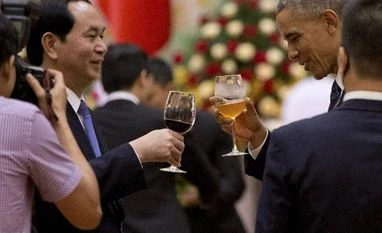After knocking down one of the last vestiges of Cold War antagonism with a former war enemy, President Barack Obama on Tuesday took his push for closer ties directly to the Vietnamese people, meeting with activists and entrepreneurs.
Amid the geopolitical statecraft, he faces calls to more strongly address what's seen as an abysmal human rights record.
Obama spoke with 10 activists on Tuesday, including advocates for the disabled, sexual minorities, a pastor and advocates for freedom of speech, press and the Internet, but he said that several others were prevented from coming.
He was to give a speech aimed at the people of Vietnam a day after announcing the lifting of a five-decade-old arms sales embargo that's meant to help forge a new economic and security relationship with this young, fast-growing Southeast Asian nation.
Obama must balance a desire for a stronger relationship with efforts to hold its communist leadership to account over what activists say is the widespread abuse of dissidents.
From Hanoi, Obama was to fly today to Ho Chi Minh City, formerly Saigon. He planned a visit to the Jade Pagoda, considered one of the most beautiful pagodas in southern Vietnam and a repository of religious documents that includes more than 300 statues and other relics.
Shifting from the historical to the modern, Obama also planned to visit the Dreamplex business complex in downtown Ho Chi Minh City, a space for startup entrepreneurs that fits with Obama's message about the potential benefits of closer ties to Vietnam's growing economy and its burgeoning middle class.
Obama also planned to meet with entrepreneurs, letting him talk up the benefits of what he says will be enhanced trade under a 12-nation trans-Pacific trade deal that is stalled in Congress and opposed by the leading US presidential candidates.
During a news conference on Monday, with Vietnam's president, Obama traced the arc of the US-Vietnamese relationship through cooperation, conflict, "painful separation" and a long reconciliation. "If you consider where we have been and where we are now, the transformation in the relations between our two countries is remarkable," Obama said.
President Tran Dai Quang said later at a lavish state luncheon that he was grateful for the American people's efforts to put an end to "an unhappy chapter in the two countries' history," referring to the 1965-1975 US war with Vietnam's communists, who now run the country.
Amid the geopolitical statecraft, he faces calls to more strongly address what's seen as an abysmal human rights record.
Obama spoke with 10 activists on Tuesday, including advocates for the disabled, sexual minorities, a pastor and advocates for freedom of speech, press and the Internet, but he said that several others were prevented from coming.
Also Read
"Vietnam has made remarkable strides in many ways," Obama said, but "there are still areas of significant concern."
He was to give a speech aimed at the people of Vietnam a day after announcing the lifting of a five-decade-old arms sales embargo that's meant to help forge a new economic and security relationship with this young, fast-growing Southeast Asian nation.
Obama must balance a desire for a stronger relationship with efforts to hold its communist leadership to account over what activists say is the widespread abuse of dissidents.
From Hanoi, Obama was to fly today to Ho Chi Minh City, formerly Saigon. He planned a visit to the Jade Pagoda, considered one of the most beautiful pagodas in southern Vietnam and a repository of religious documents that includes more than 300 statues and other relics.
Shifting from the historical to the modern, Obama also planned to visit the Dreamplex business complex in downtown Ho Chi Minh City, a space for startup entrepreneurs that fits with Obama's message about the potential benefits of closer ties to Vietnam's growing economy and its burgeoning middle class.
Obama also planned to meet with entrepreneurs, letting him talk up the benefits of what he says will be enhanced trade under a 12-nation trans-Pacific trade deal that is stalled in Congress and opposed by the leading US presidential candidates.
During a news conference on Monday, with Vietnam's president, Obama traced the arc of the US-Vietnamese relationship through cooperation, conflict, "painful separation" and a long reconciliation. "If you consider where we have been and where we are now, the transformation in the relations between our two countries is remarkable," Obama said.
President Tran Dai Quang said later at a lavish state luncheon that he was grateful for the American people's efforts to put an end to "an unhappy chapter in the two countries' history," referring to the 1965-1975 US war with Vietnam's communists, who now run the country.
)